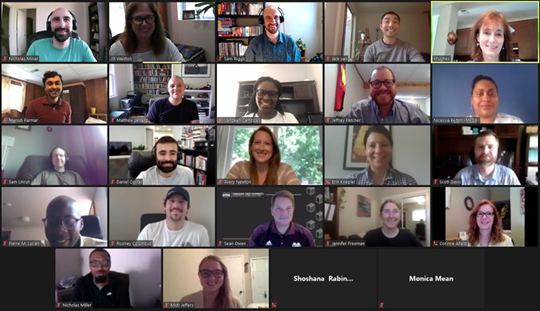Reflections on the CTE Research Network’s 2020 Training Institute
Reflections on the CTE Research Network’s 2020 Training Institute

Our 2020 CTE Research Training Institute was a great success—even with the sudden shift to a virtual setting. Shaun Dougherty, network co-principal investigator, and Jill Walston, network training lead, reflect on the five-day institute and its goal of building the next generation of CTE researchers.
>> View the Training Institute agenda, recordings, and resources
One of the goals of the CTE Research Network is to expand the pool of individuals equipped to conduct rigorous quantitative evaluations of CTE programs and policies. In August 2020, the CTE Research Network hosted its first CTE Research Training Institute to provide comprehensive training for this kind of research. In a virtual format spread across 5 days, 18 trainees joined from across the country to learn more about CTE policies, practices, and current research, as well as how to apply analytic methods that can support causal inference in the context of CTE research.
Students included those in academic positions, in state and large district departments of education, research organizations, and doctoral students. This variety was a plus. As one student noted:
“Really enjoyed that there were participants from all different lines of work and background. It allowed for great discussion and questions that were brought up during discussions that I would have never thought of.”
The training included presentations and facilitated sessions by top scholars, policymakers, and representatives of the Institute of Education Sciences, which oversees the CTE Research Network. Sessions covered topics ranging from the scope and findings of CTE research over the last 20 years to applied labs focused on developing skills in the application of causal research methods using real data. The students seemed to appreciate the mix of lecture, analysis exercises, and small group work. Two students shared this feedback:
“The balance of being taught the methods, getting the chance to apply them through the scenarios, and then getting expert feedback in office hours is a complete learning cycle.”
“The assignments allowed us to get our hands dirty actually doing some analyses, while the lectures provided historical and contemporary context I was not familiar with.”
Switching from our originally planned in-person format to a virtual event presented challenges, but by all measures the inaugural training was a success. We spaced out the whole-group presentations, individual time for reading, and small-group time for analysis work throughout the day. The Zoom platform supported interactive breakout rooms for small-group work, and the manageable group size allowed for frequent interaction in the virtual setting.
Participant feedback was overwhelmingly positive and constructive. This feedback will guide the refinement of the sessions for the 2021 Training Institute. We look forward to keeping up with our students to hear about their research projects and to ask their help in recruiting new students next year. In the meantime, the CTE Research Network is developing practitioner-focused training modules that will be available through our website in the coming weeks for asynchronous viewing.
Upcoming training: Sign up for the network’s mailing list to be notified when we will be accepting applications for the 2021 CTE Research Training Institute and to learn about other training opportunities.
